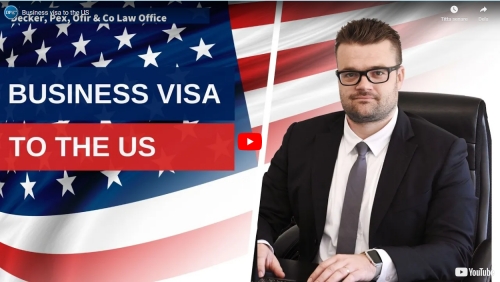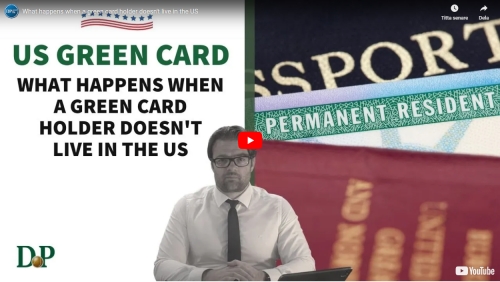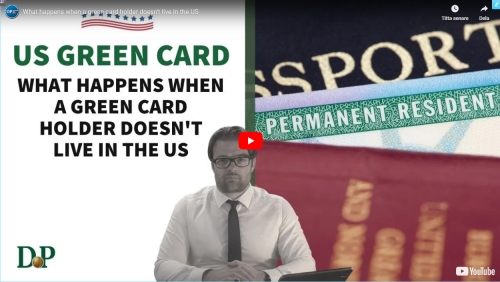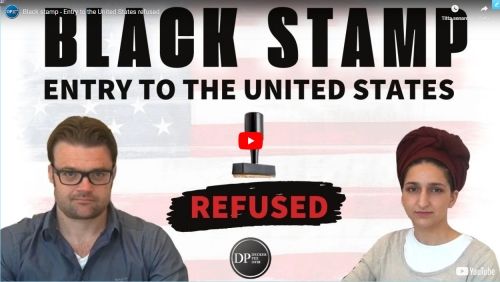As of the time of writing this article Israeli citizens are still required to obtain a visa to enter to the United States for purposes such as tourism or work. Unless they hold dual citizenship with another country and possess a foreign passport that grants visa-free entry to the United States (such as certain European Union passports), Israeli citizens must navigate the intricate procedure of scheduling an appointment at the American Embassy, undergoing an interview to obtain a visa, and providing the required documentation to support their visa application. Unfortunately, this process is not always straightforward, and as a consequence, some individuals may end up being classified as being denied entry to the United States.
This can be especially frustrating when the embassy fails to disclose the specific reasons for their decision to deny the visa. Generally, the visa applicants will be given a brief and general response without detailed explanations regarding the reasons for the rejection. This lack of information makes it challenging to understand what needs to be done in order to receive the requested visa in the future. As exemplified in this guide, there can be many reasons for the refusal of the visa application.
An equally frustrating situation occurs when, despite having an approved visa, visa holders are denied entry into the United State by border inspectors upon arrival. Additionally, there are instances where, for various reasons, such as overstaying in the country, individuals face deportation from the US and are prohibited from reentering the country in the future , known as a “black stamp“. A black stamp is used to signify that a visa holder has not complied with the conditions and obligations associated with their US visa. This can occur when visa holders engage in unlawful employment, exceed their authorized stay in the US, or violate US laws. Typically, this issue arises with tourist visa holders who are found working despite the restriction on their visa. Another common situation is when individuals stay in the US for a period longer than the authorized departure date specified on their entry visa.
US immigration authorities typically adopt a stringent approach, imposing long-term bans on future entry into the country, sometimes lasting for several years. This situation is frequently both frustrating and highly restrictive. Many of those denied entry to the US have family and acquaintances residing there, and as a consequence of the refusal, they are deprived of the opportunity to visit them. Moreover, such refusals often prevent the possibility of coming to the United States for purposes such as work and business. Imagine, for example, a situation where a person worked illegally in the US in his early 20s, was caught by the authorities and was sanctioned with a 10-year ban on entry. Several years later, the same person, who has since completed his academic studies and found a respectable job, was sent on a business trip to the Unites States on behalf of his employer, but in practice he is unable to enter, due to the sanction imposed on him in the past.
In complex situations like these, it is important to know that even when things seem hopeless, there is still a possibility for individuals who have been denied entry to the Unites States to achieve success in obtaining the long-awaited visa or necessary entry permit. Dealing with such issues effectively with the U.S. authorities can make a significant difference. Considering the complexity of these requests and the need for expertise in handling them, it is advisable to seek the assistance of an immigration lawyer specializing in U.S. immigration law. In the following sections, we will elaborate on specific situations involving entry denials to the US and explore potential courses of action to address them.
Possible reasons for denying entry to the United States
As previously mentioned, there are numerous factors that can result in United States authorities choosing to deny entry to the country. A common example of such a reason is a decision by the American authorities to refuse entry as part of the process for obtaining a tourist visa (type B1/B2). Sometimes, the reason for refusal can be purely technical, such as instances where errors are made while completing the visa application form (DS-160). Additionally, previous immigration violations, including overstaying a previous visa, unauthorized work, or illegal entry attempts, can also lead to denial of entry. Individuals with a criminal history, particularly for serious offenses, may be considered inadmissible and denied entry. In other cases, the decision may be influenced by the embassy officials’ perception of the visa applicants during the interview. If it is found, for example, that the interviewees provided inaccurate or unreliable information, or alternatively the impression is given that the applicants intend to immigrate to the United States, there is a high chance that their visa application will be refused.
Furthermore, there are various situations in which visa applications may be refused by US immigration authorities. These include cases involving relatively young applicants, such as teenagers or individuals in their early twenties; applicants without stable employment or other circumstances that suggest a commitment to their home country (such as ongoing studies or starting a family); applicants with a history of minor criminal offenses; and applicants with family connections in the United States (which may be perceived by embassy officials as potential evidence of an intention to illegally immigrate to the US).
It is important to know that in cases such as those described above, embassy personnel have the authority not only to deny the particular visa application but also to reject future visa applications. Consequently, the applicants will be deemed ineligible for entry into the United States, and if they submit subsequent visa applications in the future, those applications may be rejected outright. In simpler terms, declining a visa application can have long-term consequences for future attempts to obtain a visa.
Refusal of entry decisions at the Unites States border crossings
In addition to the situations, we discussed earlier, there are numerous instances where individuals who have been issued a visa may face refusal when attempting to enter the United States at the border crossing. As strange as it may sound, it is important to understand that simply receiving the visa at the American embassy does not guarantee that the visa holders will necessarily be allowed to visit the country. Much like the situation in Israel, border controllers at the airports and at the foot border crossings to the US may still decide not to allow entry into the land of unlimited possibilities based on their conversation with the arriving foreign citizen, even if said citizen has all the required documents.
Refusal of entry commonly occurs when applicants fail to demonstrate sufficient financial means to support themselves throughout their stay. Additionally, border officers may refuse entry based on security concerns. Since the tragic events of 9/11 in 2001, the country’s immigration authorities have adopted a stringent stance regarding individuals who raise security suspicions. Consequently, even if individuals have been granted a visa, those who are deemed as potential members of a terrorist organization or involved in terrorist activities may still be denied entry upon arrival in the U.S.
Furthermore, this situation frequently arises when individuals lack the appropriate visa for their specific purpose of visit, leading to the denial of their entry into the country. It often occurs among green card holders (individuals with permanent residency status) in the USA. Green card holders are required to maintain regular stay in the U.S. to keep their green cards valid. If they leave the country for an extended period without a justifiable reason from the perspective of border officers, their green card may be revoked, resulting in their denial of entry into the country.
Deportation from the Unites States- More common that you might think
As previously mentioned, a decision of being denied entry to the United States may be made not only at the American consulate or at the border crossing into the country, but also after visa holders have already entered the country. One of the most frequent scenarios involves individuals overstaying their authorized period of stay or engaging in unauthorized employment (working without the appropriate work visa). Such cases are prevalent among visitors who initially enter the United States with a tourist visa and end up taking on temporary jobs (e.g., selling merchandise in malls). Those who are apprehended by immigration authorities or who exceed the visa expiration date may face deportation and, in most instances, will be subject to future entry restrictions to the U.S.
What to do when faced with a denial of entry to the US?
It’s crucial to understand that a refusal of entry is not necessarily the end of the story. There is a possibility to challenge the decision through a process called a WAIVER. As part of this procedure, a special application is submitted for entry to the U.S., despite the classification as denied entry. When someone is found ineligible for entry due to certain grounds such as criminal history, immigration violations, or other disqualifying factors, they can submit a waiver application to request permission to enter the US despite their inadmissibility.
The waiver process involves submitting a formal application, typically accompanied by supporting documentation and legal arguments, to demonstrate why the person should be granted entry despite their inadmissibility. The decision on the waiver application is made by the appropriate US immigration authorities, taking into account factors such as the individual’s personal circumstances, the nature of the inadmissibility, and any compelling reasons for allowing entry.
For the purpose of submitting the application, it is important to point out reasons that justify entry into the country, as well as to present evidence for the immigration authorities’ opinion that the appellants do not intend to immigrate or stay there after the expiration of the visa in their possession. While these requests can be legally complex, they often offer a chance for individuals who have been refused entry to finally obtain the visa they have been eagerly waiting for.
How an Immigration Lawyer Specializing in Immigration Law Can Assist with Entry Refusal to the USA?
An immigration lawyer specializing in U.S. immigration law can provide valuable assistance in comprehending the grounds for visa application rejection and offer guidance on the possibility of obtaining a visa despite the initial refusal. Their expertise in U.S. immigration laws, regular interaction with immigration authorities, and experience in handling such cases enable them to deliver tailored advice and support, while formulating an effective strategy for obtaining the appropriate visa category. Given these numerous advantages, it is highly recommended for individuals who have been denied entry to seek the representation and guidance of an immigration lawyer throughout their visa application process.
Decker, Pex, Levi is a reputable law firm that specializes in all aspects of U.S. immigration law. Our team of immigration lawyers boasts vast experience and a comprehensive understanding of the American laws. We will be happy to assist you every step of the way, offering invaluable guidance, answering your queries, and providing expert advice tailored to your specific needs. For any additional questions on the subject, or for the purpose of coordinating a consultation with a lawyer specializing in immigration law to the United States from our office, in Jerusalem or Tel Aviv, you can contact us here or by phone at 03-3724722.













